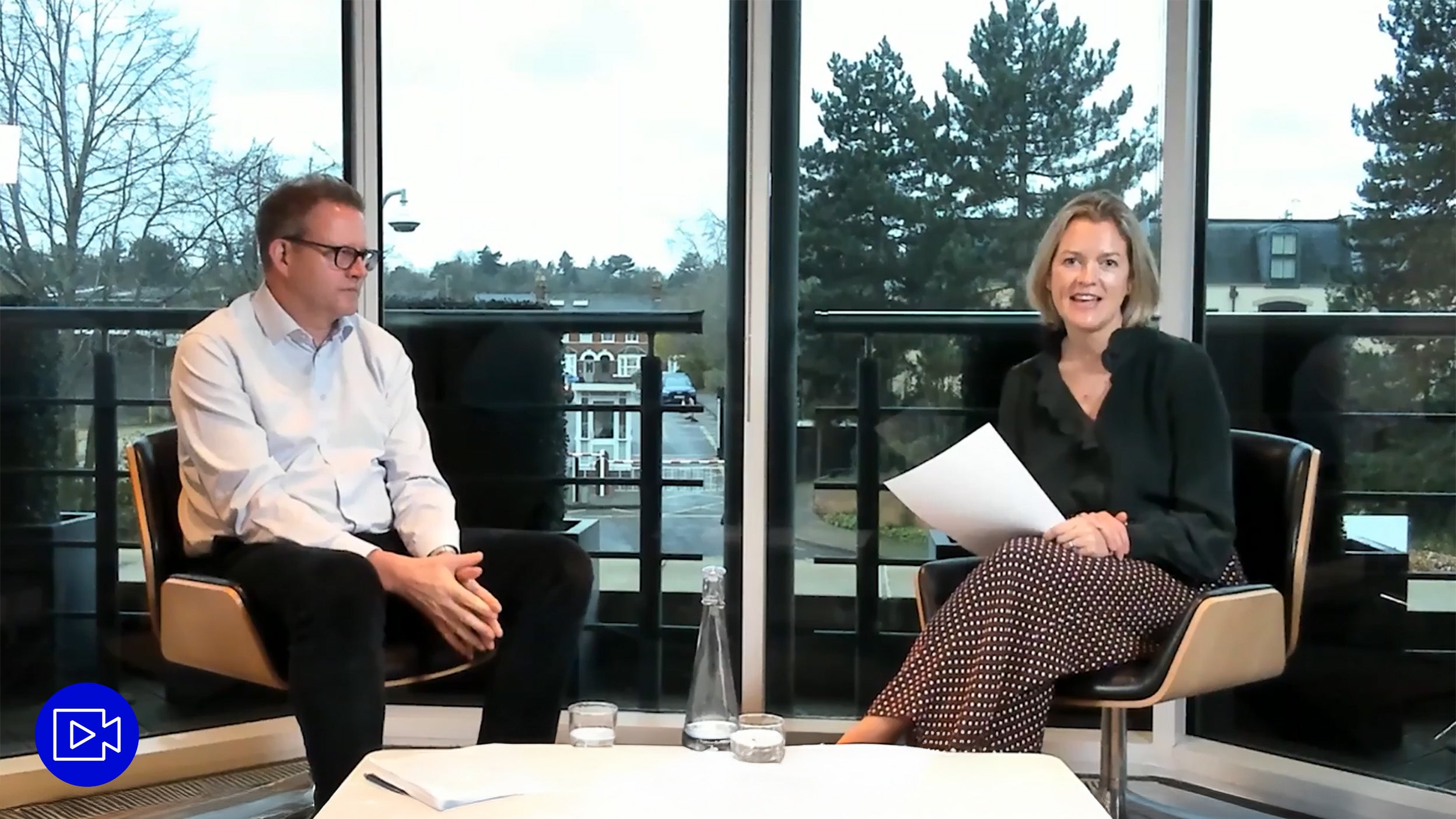Georgina Miller:
Hello, and thank you for joining us today. This is the second in our quarterly series, a conversation with where we discuss markets and opportunities for investors in UK and European equities. My name is Georgina Miller. I'm one of the product directors on the team, and this morning I'm joined by Oliver Collin, who is co-head of the UK and European equities team at Invesco. So Ollie, let's dive straight into it. What a turnaround we've had at all levels in recent months. Only a few months ago, no one was interested in Europe, much to my frustration. The team, well, the performance across the funds was hurting a bit.
And yet recently or now, today, fast-forward here we are and all eyes are on Europe as a region. There's been a huge turnaround in terms of investor engagement, and of course our performance across the portfolios has improved too. Let's talk a bit about why that's happened, and I suppose if we think about what's happened most recently, yesterday we had the vote in Germany, what exactly was that vote all about and why is it so significant for investors in Europe today?
Oliver Collin:
Yeah, thanks and thanks for having me on here. In terms of yesterday's votes, I would say we really shouldn't underestimate the importance of it. There are a couple of reasons why. Number one, that Germany's been in recession for three years. And Germany, as we all know, is about 25% of Europe. So when 25% of the European economy is in recession, that obviously impedes European growth as a whole. The second thing is that the numbers themselves are big, big numbers. 500 billion, to put that into context, is the same size as the jobs act in the US. But as we know, the European economy is only 60% the size of the US. And to put it into context specifically for Germany, it's about a sixth of the size of the US. So this is a very big number. It means at least a percent of GDP in terms of additional growth for the next decade, and that's really important too.
It's 10 years worth of growth, not a one hit wonder. And I think the last point to make is that I think the move away from the debt break and the black zero, I think people think of this seismic shock and they should. But we should also remember that this was only put in place post GFC. It's only been in place since 2009. And then if you think about how Europe has lagged in terms of global growth versus US growth, it is quite well correlated with when that fiscal handbrake was put in place. So all three of those combined means I think that this year's news and yesterday's vote are really material.
Georgina Miller:
Great. So this has obviously been a really significant trigger in terms of getting investors to re-engage with the region. But something we were talking about a lot suddenly in the second half of last year, was how the macroeconomic picture in the region was also much improved or it was much better than a lot of investors were giving it credit for. Is that still the case and do you think that's going to help investment in the region or help investors to make good returns in the region over the longer term?
Oliver Collin:
Yeah. And I think that's a really good point that if we think about where the economy was at the end of last year, the fourth quarter GDP numbers came in ahead of expectations. The loan growth numbers are starting to pick up. We're seeing the benefits of those rate cuts. We've come from four point a half percent base rates to two point a half percent, and the expectations are they go to two. And as I say, loan growth has started to pick up. Employment numbers look good. Wage growth is still double what it's been for the previous decade. That's good for the domestic consumption story. As a European investor or as European investors, I think we've long been frustrated that the underlying economy has actually been in pretty good shape. And much better shape than maybe the interest in the region, to your earlier point, has been.
Georgina Miller:
Yes, absolutely. And so if I'm thinking about investing in the region, with everything you've just said about the stimulus, about the macroeconomic picture being perhaps better than most people have been giving it credit for a long time. If I was thinking investing, would it not just be easier to a passive product or is there a case still to be made for active investing in the region?
Oliver Collin:
Yeah, so a bit of a low blow to ask an active fund manager if we should be playing the theme through passives. But I think passives do have a place clearly, but I think that there is a complexity to what's going on in the world. And complexity typically favors stock pickers rather than just generically buying an index level fund, for example. To put that into some more real terms, we've got a huge dispersion within interest sectors. So if you think about tech hardware in Europe, you've got the equipment makers. So the SMLs, the SMIs of this world where the valuations are vastly different to the analog semiconductor names, the likes of STMicro and Infineon. And all of those are bundled in IT hardware.
If you think about the material space specifically looking at chemicals, you've got the ingredients names where those valuations have been relatively well-supported of late. Whereas you've got the upstream bulk chemical names where those valuations are on low expectations pretty cheap. So again, you could buy into materials, you could buy into cyclicality, but you'd be getting very different outcomes if you buy the index versus individual stocks.
Georgina Miller:
Yes, and that brings us nicely around the portfolio and some of the positioning we've got there. And for anyone watching this today, they might be also thinking, well, where is that positioning today? Where did it go wrong as such last year where performance struggled a bit, if we're honest? But what's changed because obviously the performance year to date has turned around markedly? And what have we learned from last year? What gives us the confidence that this turnaround of performance is going to continue going forward into '25 and beyond?
Oliver Collin:
Yeah, so I guess look, a very quick review of 2024. There were two things that hurt the performance of the fund. Number one, it was a very thematic year and we've talked about no one was engaging in some of the underlying economic growth of the region. And the underlying improvement in the consumer and the benefit of those rates. And what that meant was if you are not engaged in the underlying economy, you are typically buying stocks in the region that are not European plays. They're international plays, they're thematic plays. And I think the obvious one of those was AI, where the European plays on the AI theme were energy plays. So these were the cabling businesses or the infrastructure plays into the data centers, et cetera.
And these companies are intrinsically cyclical, but they did incredibly well. On the other side, what we got wrong was owning some of the upstream cyclicals, and that was a play on the inventory cycle. What we got wrong about the inventory cycle was we could see the inventory levels were high and were falling, but there were two big assumptions in inventory falling. Number one is where inventory is normalized to, and the second one is the underlying GDP. If you remember very quickly, COVID led to just in time going to just in case inventories. We expected just in case to continue. And that leads to an inventory number that comes down, but not to previous 2019 levels.
What's happened is they've gone back to 2019 levels, so that inventory correction is bigger than we anticipated. Add to that, the global GDP was slower in '24 than we expected, and so it takes longer as well to rebase to a lower number. And that means that upstream materials names were impeded last year. So put those two together and it equals the performance. What I think we're excited about into 2025 though, is that the underlying economic benefits that we've already talked about are there. And the second point is this German impulse means that we start to get a broadening out. And as we get a broadening out, that really benefits our portfolios which are not concentrated in those thematics almost stylistically.
Georgina Miller:
Yeah, absolutely. So that's been a really helpful overview. Thank you very much about what's changed in recent months, both regionally but also within the portfolios. If you've got any questions, would like to dig into any of this further, please don't hesitate to get in touch with the team. We're always here to answer your questions. Thank you very much.






